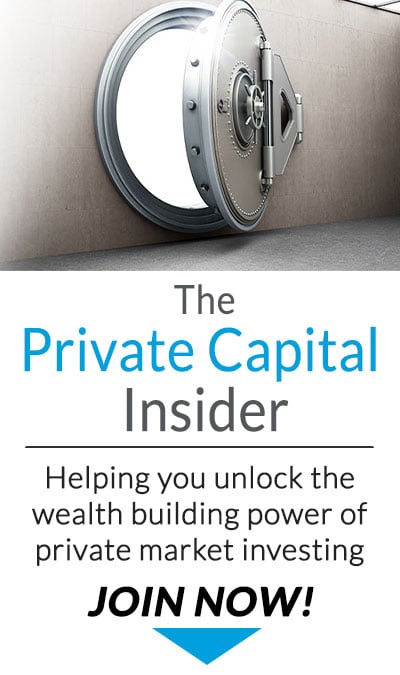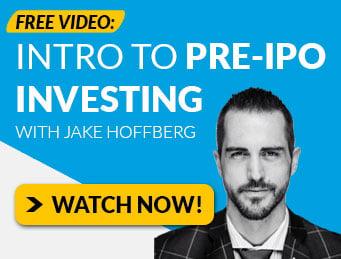The goal of the Great Game of Private Capital is to increase cash flow, grow net worth, and increase your buying power so that you can live the life of your dreams.
And if you’re looking for a faster way to accomplish your financial goals, there’s ONE HABIT that separates the most successful “players” from everyone else.
They’re ALWAYS looking for easy ways to generate “guaranteed” returns!
How do they do it? They avoid Public Market Risk like the plague and focus on easy financial wins.
So if you’re looking for some ideas on improving your financial health WITHOUT taking on additional risk or uncertainty, that’s what today’s issue is all about.
-Jake Hoffberg
P.S. We appreciate that for many people, their life savings is not a game.
However, we choose to present our investor education as a game because the purpose of games is to develop key skill sets you can use in the real world (and hopefully have fun along the way).
As a reminder, securities sold under Reg CF, Reg A, and Reg D are often considered high risk and speculative in nature. Please do not invest funds you cannot afford to lose or otherwise need immediate access to.
How to Target Guaranteed Returns By Retiring Liabilities (and Other Non-Performing Debt)
Last week, I asked our Private Capital Insider readers which financial goal they were most focused on achieving right now.

Not surprisingly, almost half of all respondents noted they are focused on acquiring more appreciating assets (which indicates many people are firmly in the “wealth building” phase of their journey).
As the name Private Capital Insider suggests, we’re somewhat biased when it comes to the type of assets we’re looking to acquire.
But here’s the problem with basically all forms of investing: They carry some form of risk and uncertainty that is notoriously difficult to understand and price correctly, especially for early stage companies.
In fact, to my knowledge, the only thing that can legally claim “guaranteed” returns are annuities and US Treasuries –– both of which are considered to have such an unlikely probability of default, they are “risk free.”
And even though we’re seeing some rather attractive ~5% yields from money market funds and 3-month Treasuries… It’s anyone’s guess how long those rates will be available.
Even if you could get a guaranteed 5% compound annual growth rate (CAGR) on your entire portfolio for the next 10 years… at best, you’re looking at turning every $1 into $1.63

If you want to 3x your portfolio over the next 10 years you need a ~12% CAGR. 5x in 10 years requires ~17.5% CAGR. 10x in 10 requires ~29% CAGR.
This means you likely need to take more risk in order to increase your potential returns.
But here’s the thing most “Players” forget about the game of money: Compounding works in both directions!
As the saying goes, “A penny saved is a penny earned.” Every percentage point of drag on your portfolio creates compounding losses over time.
So if you want to make the magic of compounding work FOR you instead of against you…
Often times your easiest wins are found in applying corporate finance principles to your personal financial life and cleaning up portfolio drag (vs taking on additional risk to get an additional 1% of CAGR).

Here’s what I mean…
The main difference between personal finance and corporate finance is the use of leverage (aka “credit” or “debt”).
Said another way, in corporate finance, managers are actively looking for ways to acquire more capital for the purpose of investing it at a higher rate than they borrow.
If you can borrow money at 5% APY, and lend it out at 25%, this 20% gap – called the “spread” – is basically “free” money.
(Note: Most people don’t know this, but when you deposit your money into a bank, it’s not “your money” anymore. In reality, your deposit is structured as a loan to the bank – which they pay interest on – and then the bank lends it out at higher rates. This is the backbone of the fractional reserve banking system).
But the vast majority of people seem to do the opposite with their personal finance.
Instead of borrowing money to acquire appreciating assets that spin off cash flow, and then paying off the debt using the cash flows from the asset they acquired…
They borrow and buy depreciating assets that require ongoing upkeep (or otherwise borrow and spend on consumables).
In corporate finance, it would be standard practice to constantly monitor the debt-to-income ratio, creditworthiness, and ability to manage debt repayment.
In fact, any investor looking to buy a financial product from a company would want to see that management can demonstrate proper financial controls and reporting systems for exactly the reasons we’ve discussed.
So why aren’t we taking a page out of the corporate finance playbook and applying the same lessons to our own Personal P&L?
Why aren’t we more focused on improving our credit scores, building lower cost credit facilities, and then refinancing our high interest debt?
Sure, I totally understand that it’s easier to believe that one spin of the wheel in the penny stock lottery can make us so rich, it would undo years of poor financial management and bad investment decisions…
But in the real world, every successful investor I know is ruthlessly focused on improving their net cash flow through basic financial engineering.
More cash flow leads to higher savings rates. Higher savings rates mean more investment capital to buy assets with.
And if you’re intentionally building your balance sheets by acquiring appreciating assets you can borrow against… it means you can continue to unlock cheaper forms of capital that you can then use to invest in more opportunities.
That’s the way billionaires do it. Why not you?





